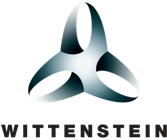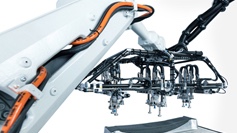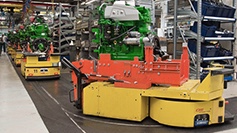WITTENSTEIN spearheads Industry 4.0 as a future project
At the group's press briefing at the Hanover Fair Dr. Manfred Wittenstein, President of WITTENSTEIN AG, and Dr. Bernd Schimpf, Director Mechatronics, will explain how this high-tech IT strategy is being implemented both internally and in the context of various research projects.
Customized products and production processes, shorter delivery times, rising cost and efficiency pressure and an ever fiercer competitive climate in the world market: these are the challenges confronting almost all manufacturing companies in Germany now and in the foreseeable future. Contemporary production technologies – often characterized by specific strategies such as embedded systems, mechatronics, lean production or CIM – are rapidly approaching their limits.
"Computerized production" could provide an answer for the future: the human beings at the centre of the production process are assisted by smart machines, global networks and virtual manufacturing technologies. Providing these resources are intelligently integrated, smart and highly customized products can be created efficiently and adaptably. Germany is keen to be at the forefront of this revolution: a government-initiated future project called Industry 4.0 will promote the infusion of classic production structures with innovative information and Internet technologies. The aim is to facilitate "smart factories" to sustainably enhance productivity and flexibility.
Cyber-physical systems: The backbone of Industry 4.0
The technological backbone of Industry 4.0 is the development of cyber-physical systems (CPS), leading to interconnected business and value creation processes that will in turn make production processes more adaptable, flexible, resource efficient and ergonomically friendly. For this to happen, the CPSs must be designed with embedded software, communicate with one another in networks of any size, be equipped with sensors and actuators, supply comprehensive information, be controlled via a man-machine interface and – especially important – make use of distributed online services (cloud). It is not without reason that cloud computing is predicted by experts to be one of the mega trends in the factories of the future.
The evolution into an integrated mechatronics corporation will help WITTENSTEIN cross the technological bridge leading to the future project Industry 4.0. Horizontally and vertically networked production structures, commodities with a digital product memory, people who talk to machines, communication driven by Internet mechanisms – the fourth stage of the Industrial Revolution harbours massive opportunities. Tomorrow's products will be so intelligent that functionalities in the form of so-called industry apps will also be reloadable, allowing real production potential to be leveraged.
The sensorless positioning control currently under development is just one example of reloadable product functionality: it is designed to cover a wide speed range and be transferable from one motor to another, supported by all modern controllers and implementable as an app on servo amplifiers, generating multiple benefits in terms of price, robustness and redundancy. Reloadable functionalities can also help optimize existing production processes – as the following example from WITTENSTEIN tool drives impressively demonstrates. In other words, Industry 4.0 meets what is ultimately the most important objective: to safeguard jobs and thus Germany's position as a manufacturing location.
WITTENSTEIN tool drives: Mechatronic system construction kit anticipates Industry 4.0
WITTENSTEIN's modular tool drives system for fully automated woodworking is one instance of how production systems inspired by Industry 4.0 can reduce capital and operating costs, boost productivity, optimize value creation and hence herald in a new technology generation. Based on direct drive spindle systems for multi-spindle applications in CNC machining as well as optimally interacting accessories, it integrates all mechatronic disciplines in a scalable and flexible system construction kit. Adaptability, flexibility, resource efficiency, ergonomics – four central elements of what could be termed "Industry 4.0 compliant design". Users are able to design their own tool drives systems independently with the aid of an online System Configurator. Hole patterns can be programmed extremely flexibly and adaptably, and the drilling modules inserted or swapped ergonomically as and when required. Energy and raw material resources are conserved – after all, the ball screw is never turned unnecessarily and only those drilling modules that are actually needed for a particular machining task are active.
Finally, customer oriented services can help reduce complexity, increase the system's attractiveness for the market and guarantee a high degree of investment security. As a CPS, the tool drives system already fulfils some of the key requirements and expectations associated with Industry 4.0.
CPS use scenario at the"Future Urban Production" facility
Industry 4.0 is meanwhile taking on a concrete form at gearing specialist WITTENSTEIN bastian GmbH's production facility in Fellbach, just outside Stuttgart. Under the banner "Future Urban Production", this facility will enable smart drive systems and CPS modules such as machines, tools and clusters to be tested in a realistic manufacturing environment. The idea is that in future what bastian refers to as a "shop window factory" will show how products and concepts can be implemented on real machinery and equipment in the framework of Industry 4.0 and individual CPS modules integrated and networked in an IT reference architecture.
Active involvement in CyProS
To improve productivity and flexibility by interconnecting smart systems in the factory – in other words by fusing production and Internet technologies – is the goal of the CyProS research project, in which WITTENSTEIN has been involved as consortium leader since its launch in September 2012. In the first step, this project is concerned with building a representative range of cyber-physical modules for production and logistics systems. Next, universal procedures, tools and platforms will be made available prior to introducing CPPSs. Finally, a technical and methodological basis will be established for utilizing CPPSs efficiently and implementing them in real production environments like the ones WITTENSTEIN will show in the "shop window factory".
Intelligent parts networked to a digital manual by means of smart tags are one early example of how CPSs can be used in practice. The resulting interactive demonstration system based on a WITTENSTEIN alpha V-Drive gearhead can be admired at the Hanover Fair (Hall 2, Stand C24). It connects the tangible, physical components with the know-how contained in a digital manual. The two demo scenarios will encompass smart assembly and functional testing of a gearhead, including corrective action if the gearhead is assembled incorrectly. The advantages of this approach are undeniable: new staff can in future be inducted faster thanks to the intelligent assistance from the CPS. Any errors when complex parts and components are assembled can be detected much earlier if not avoided altogether.
WITTENSTEIN Industrial Campus: Science and industry network
Filling the gap between technological inventions and their commercialization as innovations, in other words the establishment of practical relevance within a reasonable period of time, will be an important step on the road to Industry 4.0. Specifically, this means that the technologies linked to Industry 4.0 and their potential uses need to be experienced in the form of concrete applications. WITTENSTEIN is currently investigating the idea of an "Industrial Campus" – an institute to oversee the implementation of Industry 4.0 in actual products, processes and business models. At the same time, the Industrial Campus project will facilitate interdisciplinary training of the next generation of specialized staff, blending classic engineering sciences with modern information and communication technologies.
WITTENSTEIN will one day praise the Campus graduates as "innovation pioneers". WITTENSTEIN is spearheading Industry 4.0 in many ways; in doing so, it is making a significant contribution to ensuring that German enterprises – and their production locations – stay competitive in a future that has only just begun.
Photos
- WITTENSTEIN bastian's "Future Urban Production" facility
- Meets even the highest flexibility and intelligence requirements: the WITTENSTEIN tool drives mechatronic system construction kit
- Sensorless positioning control as an example of reloadable product functionality: WITTENSTEIN motion control's simco drive servo amplifier


